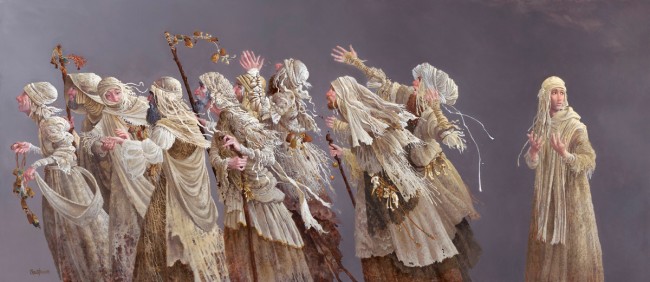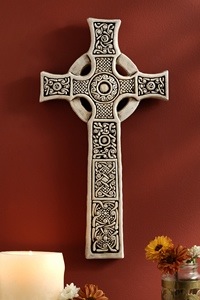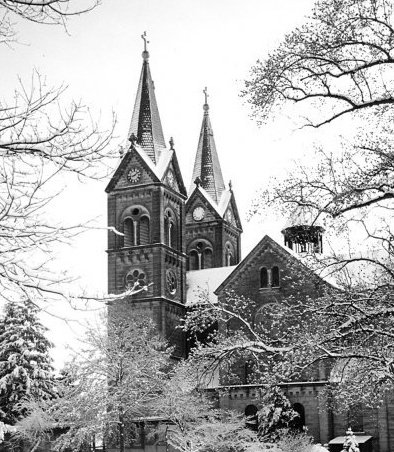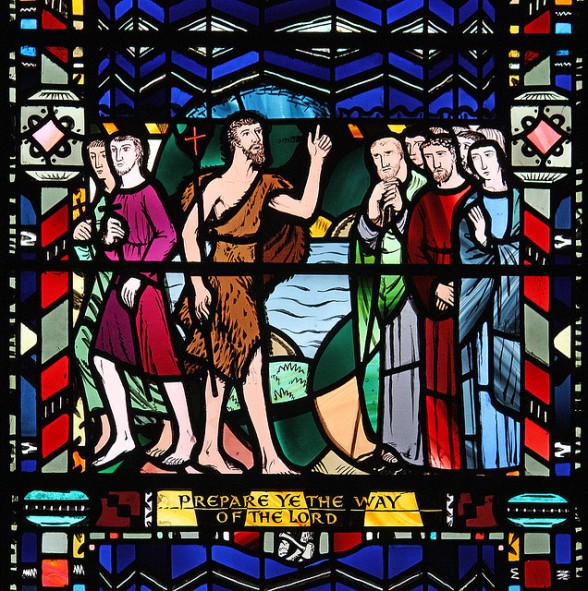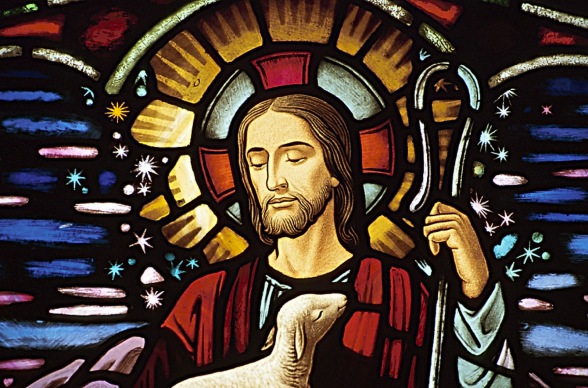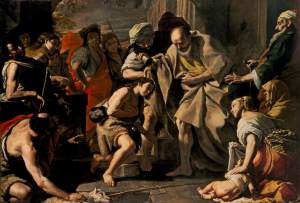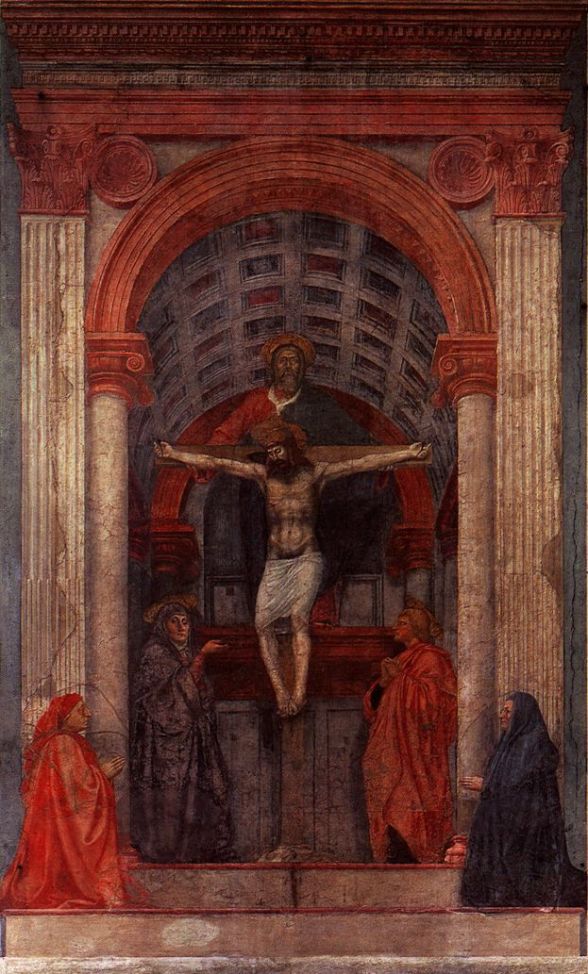The angel Gabriel from heaven came,
his wings as drifted snow, his eyes as flame;
“All hail,” said he, “thou lowly maiden Mary,
most highly favored lady,” Gloria!
“For know a blessed Mother thou shalt be,
all generations laud and honor thee,
thy Son shall be Emmanuel, by seers foretold,
most highly favored lady,” Gloria!
“Let it be,” she said. “Let it be with me, as you have said.” Let it be…
That was my favorite Beatles song. “When I find myself in times of trouble, Mother Mary comes to me, speaking words of wisdom, ‘Let it be’.” I was eleven, almost twelve years old when they released that album. I’m older than dirt now, of course. But not then. And that was my favorite song. I had no idea what it meant. People still argue about that. Some people say Paul McCartney wrote it about his mother. Sometimes he would dream that she was speaking to him. When he was troubled and confused. She would show up in his dreams and she would speak wise words to him. Just… “Let it be.” That’s what some people say the song was about.
But… some folks say, “No. That’s not it, at all.” It’s about Mary. The virgin. “The Blessed Virgin,” some Christians call her. Not Paul (McCartney’s) mother. But Jesus’. It’s about her, they say. “Let It Be” is about the mother of our Lord. And… I don’t know the answer. Maybe it is. Paul’s mother really was named Mary, you know. And his father didn’t go to church… to any church, I mean. But his mom was Catholic. So… maybe that song is… Can I say it? Maybe that old Beatles’ song is a religious song. Something like a hymn.
Two weeks from today is our Christmas Cantata. Maybe the choir will sing something from the Beatles. Wouldn’t that be something? Teen-age people trying to get past the ushers to get Scott’s autograph! It’s something to think about. We might make the evening news, get a write-up in the paper, go viral on YouTube… Wouldn’t that be something?
There was a church somewhere out West (beyond the Ohio River!) that could’ve been on YouTube. They had their Cantata on the third Sunday of Advent. The Sunday of Joy, mind you, though it ended with tears.
Every year, on the Third Sunday of Advent, they would start the service with a processional carol. The choir would come down the aisle singing, “O Come, All Ye Faithful.” And at the end of the service they would go out singing Charles Wesley’s great Christmas hymn, “Hark! the Herald Angels Sing!” It was tradition.
And this was a small town church in the heartland, they call it. With a beautiful sanctuary. Wainscoting around the walls, and beautiful arches and woodwork up above. And there were stained glass windows with lots of reds and blues. And a small pipe organ that was just right for a church of that size. A lovely church with a lovely sanctuary, heated by an old-fashioned floor furnace.
Do you remember them? It’s what we had at home when I was a kid. And that thing caused all kinds of problems for me when I was little. Because I’d come in from the cold and stand there on the grating to get warm. I’d always stand just a little too long. And my mom would detect the not-so-delicate scent of burning rubber as the soles of my shoes started to melt. And those were not some of her happier moments. Or mine. But I thought it was so neat to have tennis shoe soles that looked like Belgian waffles — or a giant tic-tack-to on my toes.
So that’s what they had there in that church. They had a floor furnace. And the grating was right there in the center aisle.
The choir started down the aisle on the third Sunday of Advent, walking in procession two by two. Full of warmth and dignity in their new choir robes. And each person was exactly one-point-five pews behind the person in front of them. With the cross and the acolytes leading the way.
And just as the last alto got half-way down the aisle, she stepped on the furnace — on the grating, I mean. And she had bought a new pair of heels to wear for the Christmas cantata. And they were lovely. Same color as the choir robe. But the heels were thin — about as big around as a no. 2, Ticonderoga pencil, I’d say. And one of them went through the grating and stuck there. She tugged at it a few times and shook her foot. (I’ve seen horses do something a lot like that.)
She tugged and shook. But it was stuck. And the tenor behind her was getting closer. So with all the grace and dignity she could rally, she slipped her foot out of the shoe and went floppily hobbling up the aisle with one shoe off and one shoe on.
Now, the tenor who was coming up behind her looked down. And… he realized what had just happened. Oh, and he knew that if that shoe was left sticking up in the middle of the aisle, people would see it and, as the old revival preachers used to say, it would “break up the meeting.” The place would just roar with laughter. So, quick thinker that he was, he reached down, grabbed the shoe, and gave it a good, hard twist.
And it shocked him, I think. Because, when he pulled the shoe up, the entire grate came up with it. And he was so stunned by this that he just kept on processing. Marching in time with the music, with a floor grate and a shoe in his hand. X One-point-five pews behind him, of course, there was another tenor — a near-sighted, bespectacled, bifocal-wearing tenor, with his nose in his hymnal so he could see. And he stepped right into it. Fell right into the hole. So… there were tears. Lots of tears. Tears of laughter and tears of pain. He just fell right into it.
I had a teacher in seminary who used to say, “These things happen for a reason. It’s to help us understand what the first Christmas was really like.” It wasn’t all polished and perfected. It didn’t happen the way anyone expected it to. It caught them off guard. Hit them unaware, right out of the blue. And somebody was embarrassed. Somebody was nervous. Somebody surely didn’t know what to do. And I’ve a feeling, Mary and Joseph felt a little off balance. A little awkward, maybe. Like they were hobbling along. And like that poor unsuspecting, near-sighted tenor, they probably felt as though they’d stepped into it. Really. I mean… can you imagine?
Just look at Mary. She was so young. Still a child in some ways. In her early teens. Maybe thirteen, or fourteen… or even younger. She wasn’t a queen or a princess, or even the daughter of some well-to-do businessman. She was an ordinary young girl. From a not-so-well-to-do place called Nazareth. A small town girl she was. And like a lot of other people in those days, her family had a hard time just trying to make ends meet. Because they were nearly taxed to death by the government to begin with. And most of the tax-collectors [themselves] were as crooked as a back road in MacDowell county.… That’s why they always talked about tax-collectors and sinners in the same breath.
Times were hard. The living was not easy. And living in Nazareth, of all places… it was like the old John Denver song about Toledo. “Saturday night in Toledo, Ohio is like being no place at all”. That was Nazareth. Not much happening there. Until one night a stranger came with a message… for her. For this girl. And when he found her he greeted her. Hail! he said. Not Hi! Or Hey there! Or What’s up, girlfriend! But hail. Hail!
People said that back then. People said it out of respect… Remember? “Hail, Caesar!” was something they said in those days. “Hail to the King! Hail to the Queen!” And what is it the band always plays when the President steps off the plane? Hail! Hail to the Chief! But this stranger came to this young, young woman and… No one had ever heard of her, or even noticed her, really… But the stranger – the visitor said, “Hail! You who are highly favored. The Lord is with you!”
Oh, it caught her completely off guard. “Who is this? What does he want with me?” She was just so young. And nothing like this had ever happened before. At least, not to her! And she wasn’t too sure what was happening now… I run scared when a mouse appears. And if it’s a winged creature… a bat, I mean… my body runs off and leaves my poor soul just standing there to fend for itself! But here is a stranger, an unexpected visitor who just appears to young Mary in this ordinary little village. And he says, “Hail!” Oh, she must have been startled. Frightened. Trembling, mind you. Because she didn’t know what this was. “What does he want? Why is he here? What is this?”
And the messenger, said, “Don’t be afraid, Mary. It is God who favors you. The Lord is with you.” Well, what would God want with such an ordinary young woman from such an ordinary place?
Gabriel (the messenger) said, “You’re going to have a baby, Mary. You’re pregnant. You’re going to give birth to a son!”
Oh, this was no ordinary greeting. And, mind you, he was no ordinary messenger. He was God’s messenger. An angel.. The angel Gabriel. The one who announced in Old Testament times that the Messiah would come and turn the whole world upside down, and bring in the Kingdom (of God).
“God favors you, Mary. God chooses you. You will give birth… and you will name him Jesus.” It means God saves. And… there was more. The angel said, “This child will be great. He will be called the Son of the Most High, and the Lord will give to him the throne of his ancestor David.”
Did you hear that? He’ll be a king, Mary. The King of all God’s people. And Gabriel, the very one who appeared in Old Testament times and announced that Messiah would come and bring in God’s kingdom, looked at Mary and said, “And of his kingdom there will be no end.”
She’d never heard of such a thing. You wonder what kept her from laughing like Sarah when the angel told her that she would give birth… when she was old. Or why she didn’t say, “You must be mistaken. You must be looking for some other Mary.” You wonder what kept her from fainting, or stumbling, or running away. But she didn’t. She just looked at the angel and said, “How can this be? I’m not even married. I’ve never even been with a man.”
And the messenger from God said, “The Holy Spirit will come upon you, and the power of the Most High will overshadow you. And the child will be holy [It means set apart]. For you see, Mary, he won’t just be your son. This child will be God’s son. And the angel wanted her to know that she wasn’t just dreaming all of this up, he said. “Your cousin Elizabeth, who’s in her old age now is going to have a son, too. And it won’t be long, now. Because she’s already in her sixth month… For you see, Mary, nothing will be impossible with God.”
Nothing… Nothing, church. Did you hear? Do you hear the message?
Sarah laughed. Abraham doubted. Moses said, “I’ve got such a temper, and I’m not a good speaker.” And the prophet Jeremiah said, “I’m too young.” Isaiah said, “My lips are unclean.” Peter said, “Go away, I’m a sinner.” And Paul had to be knocked off his horse by a blinding light before he’d even listen to God… But Mary stepped into it. Not by accident, mind you… like the poor tenor on the processional hymn. She stepped into it whole-heartedly. Knowing full well that somehow she would have to find some way to explain all of this to her fiancé, Joseph. And her family… Her parents! Can you imagine trying to explain such a thing to your parents? “It’s not what you think. Joseph had nothing to do with it.”
“Then who? Tell me his name.”
“It was God. This is God’s baby. I’m still a virgin.”
Mary stepped into it. She didn’t run away. She didn’t try to bargain or beg the dear Lord to pick somebody else. She just stepped right into it, risking everything, and yet so full of grace and trust in the One who called her, the One who favored her. Mary looked at the angel Gabriel and said, “Behold the handmaid of the Lord.” She said, “Look, I am the Lord’s servant. So… Let it be. Let it be. Oh, she said, “Let it be with me according to your word.” Just as you have said.
It reminds you of something would say years later, to the servants at the wedding in Cana of Galilee. Remember? She mentioned the wine. They had no wine. And Jesus said, “Not now. It’s not time. This isn’t my time.” And Mary turned to the servers, whispering words of wisdom. “Do whatever he tells you,” she said. And then, maybe three years later when God asked him to do the impossible. Jesus did that very thing… “Father, not my will but yours be done.”
Let it be… Let it be with me according to your word.
And the angel messenger departed from her — the maiden mild, servant, mother of our Lord.
Well, here we are. Ordinary people. In an ordinary town. Young, so very young. And not so young. And old. With unclean lips, and unclean thoughts, and not-so-good tempers, and not-so-good pasts. And every one of us a sinner. And yet, this day God sends you his greetings. And in that greeting there is a message, not so different from the one the angel Gabriel delivered to Mary. And that message is, “Hail, favored ones. The Lord is with you. You are blessed.”
And like Mary the mother of Jesus, he calls us to carry something holy within. He calls us, like her, to give birth. To let something holy and good be born from our relationship with him. Something that will call the hearts of others to turn to him. And it may be risky. You may lose your reputation. You may lose your friends. Jesus said you may even lose your life [in this world]. But Christ will be born anew — not just in your life, but in the Church, in this church, in this place, here in this world. FOR NOTHING IS IMPOSSIBLE WITH GOD. And God is here. God is with us. God is with you.
Mary, the great disciple she was called in the early Church, said “Let it be… as you have said.” And an ordinary young girl became the mother of our Lord. And something like that happens when we say yes to God’s call — when we listen to his voice and follow his lead. We become, more and more, children of the Church — who carry our brother Jesus to others. (My mother and my brothers and my sisters are those who do the will of my Father.)
Have you ever heard of a thing called Santa Claus Anonymous. It sounds like a twelve-step program for recovering elves. But it’s a group that provides gifts for children in need. Children who otherwise wouldn’t receive any Christmas gifts. And several years ago, an eleven-year-old boy heard about them at school. He was an ordinary boy, in an ordinary place called Paine’s Hollow, New York. And he heard the voice of a messenger… it wasn’t an angel, really. It was the principal. And he was speaking to the whole school. — Mohawk Central School — over the intercom. But when this eleven-year-old heard it, it was like a message from God. And what God, or the principal rather, was asking him to do was help these poor children. The needy and the lonely and the brokenhearted.
So the boy started saving every penny he could. And it was a struggle. It was hard. But on the Friday before Christmas break he had fifteen cents. And he planned to do his part and turn them in at school that day.
But there was a terrible snow storm, the kind they have only in New England. A blizzard. So the school buses couldn’t run that day. But this is what he did. The boy who was so young, (only eleven, mind you) waded through the deep snow and the wind and the cold to give his fifteen cents to the school principal. And the principal found it terribly hard to control himself as he accepted the gift. The fifteen cents. Because the boy who was eleven, almost twelve, was one of the poor, needy children whose name was on the list to receive a Christmas present from Santa Claus Anonymous.
And there in that ordinary place, in the heart of an ordinary man, Christ was born anew. Mightily and sweetly. Gently carried in the heart and life of a young boy.
Listen.… Do you hear? An angel, God’s messenger speaking to you. “Hail, you who are highly favored. The Lord is with you.” Will you bear the Christ in your life? Will you let him be born anew in you? In this church? And in the lives of others around you?
Behold the servants of the Lord. Let it be… Let it be… Let it be.
In the name of the Father, the Son, and the Holy Spirit. Amen.


